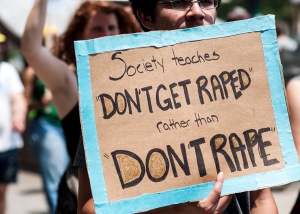 Rape culture is a term that was designed decades ago, to bring to light ways in which a society blames rape victims and rationalizes the behavior of the rapist. In a rape culture society, women may feel intimidated to speak out against actions ranging from sexual remarks, sexual touching and rape itself. In a rape culture emotional and physical terrorism against women are considered a societal norm. Shocking as it sounds; it is common practice in the United States. Furthermore, researchers have cited rape as a crime that disproportionately affects women. Majority of the rape victims are women, with only 2% representing male rape victims.
Rape culture is a term that was designed decades ago, to bring to light ways in which a society blames rape victims and rationalizes the behavior of the rapist. In a rape culture society, women may feel intimidated to speak out against actions ranging from sexual remarks, sexual touching and rape itself. In a rape culture emotional and physical terrorism against women are considered a societal norm. Shocking as it sounds; it is common practice in the United States. Furthermore, researchers have cited rape as a crime that disproportionately affects women. Majority of the rape victims are women, with only 2% representing male rape victims.
Every 2 seconds, someone in the U.S. is sexually assaulted. 1 in every 4 women report being assaulted in their lifetime. The majority of these women will be assaulted sexually multiple times. Rape culture is accepting that sexual violence exists, telling women and girls to be more careful with:
- What they wear
- How they carry themself
- Where and when they walk
…and the list goes on with the do’s and dont’s that every woman should follow in order to stay safe from sexual violence. In addition, society encourages women to take self-defense courses. A rape victim is then faulted for being in the wrong place at the wrong time or not defending themselves. That is where we are all wrong because, providing such solutions suggests that, rape comes from irresponsibility, lack of common sense, or failing to rebuking offenders to stop rape.
Still not convinced that the U.S. could be defined as a rape culture? Remember the Steubenville, Ohio rape case? A high school girl, incapacitated by alcohol, was sexually assaulted by two of her peers. The same peers then circulated nude photos of the girl all over social-media, (which reflects a high degree of disrespect for women’s dignity!) Media reports were filled with empathy for the two young men, stating the court ruling could ruin their life – ignoring that their action of sexual assault was the real cause of their misfortune. Most of the media and community supported the side of the perpetrators, adding pressure to the plaintiff and sending a message for other women and girls in similar circumstances not to come forward. A national survey in America further indicated that, only 16% of rape cases are reported to the police. This statistic tells a tragic story that sexually violence against women is not a priority and most criminals get away with it.
Women rights groups and individuals are working hard bring light and see an end in rape culture, a necessary change needed to end violence against women. Rape culture is a prevalent problem, which must be addressed from the systems level in order to make impactful changes. We must:
Address the Real Problem – Instead of asking what a woman was wearing when a rape case arises, ask why the perpetrator thought it was acceptable in the first place.
Re-examine Masculinity – Masculinity should be defined in a context free of violence. Supporting those who are or were victims of sexual assault, rape or domestic violence is manly.
Speak up – When you see behaviors or hear remarks that degrade a woman or promote rape speak up and condemn the action. If your friend makes a joke about rape, do not laugh along; rather say you don’t find it funny!
Support Survivors – This should not be a one gender role; everyone, including men, should condemn rape and support those who have survived the ordeal by listening, being patient and avoid judgment.
Rape in society needs to be given full attention. Creating awareness, although somewhat painful, is essential. We must stop victim blaming, and view rape as a violation of human rights. Cooch Coach Community is dedicated to playing a part in this change.
Writers and reporters check out this resource before covering a rape story.
